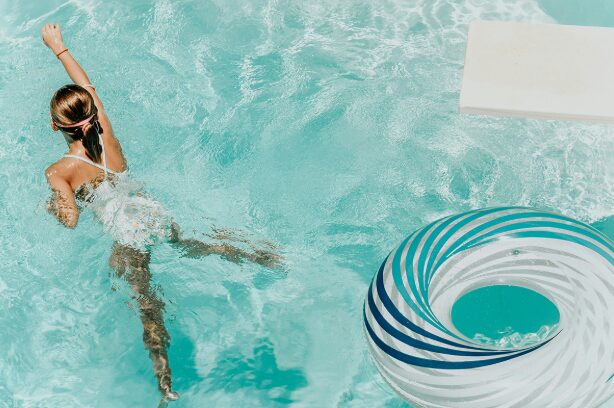As a pool heating technician with years of hands-on experience around Australia, I have seen firsthand how different pool heating systems suit various households, climates, and lifestyles. Choosing how to warm your pool is a significant decision that requires balancing efficiency, cost, comfort, and sustainability. Here, I will break down the core methods available: gas heating, electric heat pumps, and solar heating so that you can approach this choice with clarity and confidence.
Gas Pool Heating: Fast Results, Higher Costs
Gas heaters remain a classic choice for many pool owners nationwide. Their most notable advantage is speed. If spontaneous swims or entertaining guests are a top priority, gas units can lift a pool’s temperature by several degrees within hours. For spas, it’s even faster, which is why many homeowners still opt for gas in these scenarios.
Traditional installations used natural gas or LPG. The initial costs are lower compared to electric heat pumps and are often even less than those of most solar systems. Installation is usually straightforward, and newer gas models offer increased efficiency versus their predecessors. Importantly, gas heaters work year-round, unaffected by ambient weather conditions or sunlight. This gives you complete control, whether you’re swimming in the peak of summer or the heart of winter. However, the convenience comes at a price.
Gas pool heating is not as environmentally friendly as other options, as it involves emissions and ongoing pollution factors to consider. Operational costs also stack up quickly. As gas prices fluctuate and trend upward, heating a pool over extended periods can become quite expensive. Gas units, despite their improved designs, generally have a shorter lifespan, averaging about five years, compared to heat pumps and solar options. They require an outdoor, ventilated installation and either a plumbed gas line or a professionally installed propane tank. Maintenance can be simple, but be prepared to replace the heater sooner than with other systems.
Gas is best suited for those who want rapid heat on demand, particularly if pool use is irregular or you own a spa that needs quick temperature jumps.
Electric Heat Pumps: Reliable and Efficient, Weather Resistant
Electric heat pumps have soared in popularity across Australia, especially as families seek greater energy efficiency and more sustainable heating. Unlike traditional electric resistance heaters, modern heat pumps borrow heat from the air and transfer it to the pool water. This technology is impressively efficient, often delivering up to five times the energy it consumes.
A key benefit of heat pumps is their reliable performance in a wide range of weather conditions. They do not rely on sunlight, and their compact footprint makes them ideal for properties with limited space. Installation is less invasive, and with inverter models now available, operating costs and noise have dropped significantly. Inverter heat pumps adapt to demand, further enhancing energy efficiency and extending product lifespan.
Electric heat pumps provide steady warmth and can maintain pool temperature for longer swim seasons. Given the moderate Australian climate in most regions, they operate efficiently and are effective for daily pool use across spring, summer, and autumn.
Despite their strengths, heat pumps demand a significant initial investment, usually more than gas heaters. Running costs depend on your local electricity prices and can be higher than those of solar, although inverter models help mitigate this. They generally have shorter lifespans than solar systems, lasting about ten to fifteen years. Their effectiveness drops slightly in cold snaps, and backup or supplementary heating may be needed for southern locations experiencing brisk winters.
If you want a consistent pool temperature without the unpredictability of solar or the emissions of gas, heat pumps offer a compelling solution for most Australian homes.
Solar Pool Heating: Eco-Friendly, Low Running Costs, Weather Dependent
Solar pool heating is a favourite, particularly in regions bathed in consistent sunshine. Solar pool heaters utilise rooftop collectors that channel the sun’s energy to warm the water, providing a sustainable and eco-friendly method for extending your swimming season.
Installation requires adequate roof space and can be more expensive initially, but operational costs are strikingly low since the sun provides the energy for free. A high-quality solar system will last well over a decade with basic maintenance, sometimes longer. Maintenance is minimal, with few moving parts and no motors prone to failure. Solar heating dramatically reduces carbon footprint, aligning environmentally conscious homeowners with their values.
The limitations of solar are tied directly to the weather. Overcast days, seasonal shifts, or extended rain can drastically reduce effectiveness. Solar systems typically cannot heat pool water at night or during the coldest months, and their performance is notably reduced in southern regions during winter. In Melbourne or Hobart, combining solar with a supplementary heat pump may be necessary for year-round swimming.
Most standard solar installations handle pools of all standard sizes and perform admirably in spring, summer, and early autumn. In rare cases, houses equipped with rooftop photovoltaic solar panels may run short on space, requiring alternative arrangements.
Making Your Selection: Factors to Consider
With these three systems outlined, think carefully about your priorities. Long-term costs, in addition to the upfront cost, should be considered. Gas heaters demand less initial investment but come with steeper ongoing expenses over time. Electric heat pumps are more expensive at purchase but have moderate operating costs and offer weather resilience. Solar pool heating requires more initial investment, but long-term savings are considerable if your property receives ample sunlight.
Climate and pool usage patterns also matter. If unpredictable schedules or frequent parties are common, the fast action of a gas heater may appeal. For those who swim daily and appreciate a reliably warm pool, electric heat pumps rise to the top. If environmental concerns and operating expenses drive your decision, and you live in a sunny region, solar heating is hard to beat.
Space constraints affect installation. Electric heat pumps are compact, solar requires unobstructed roof area, and gas units need outdoor access with proper ventilation. Consider the practicalities for your property before committing.
Maintenance and product longevity are essential. Solar systems last the longest with minimal care, heat pumps occupy the middle ground, and gas heaters generally require more frequent replacement. Look into warranties and after-sales support from manufacturers and installers to make sure you’re protected in the long run.
Environmental impact is another important factor for some individuals. Solar pool heaters are undeniably the most eco-friendly choice, while modern high-efficiency heat pumps offer significant improvements in sustainability. Gas systems are less eco-friendly but may be suitable for those requiring sporadic or rapid heating of their swimming pool.
Regional Recommendations
Australia’s climate varies greatly. Solar heating excels in warmer regions, such as Queensland and Western Australia. Heat pumps are a reliable choice in most southern areas, especially when combined with a solar system for hybrid heating. Gas heaters remain popular for spas, commercial pools, and homes where rapid, flexible temperature changes are necessary.
Tailoring Pool Heating to Your Needs
Investing in the right pool heating system makes swimming a pleasure year-round. The choice strikes a balance between speed, efficiency, cost, and environmental impact. Gas offers speed and flexibility at a cost, electric heat pumps bring reliable efficiency and comfort, and solar delivers sustainable warmth with the lowest ongoing cost.
Consult with a qualified technician for a full site assessment before settling on a system. Consider current energy prices, pool use habits, regional climate and your home’s physical layout. When chosen wisely, the right pool heating system can transform your pool into a true backyard retreat, ready and inviting at any time of year.



































